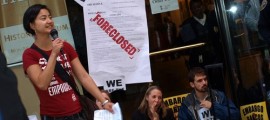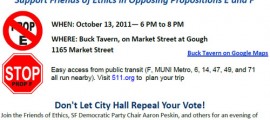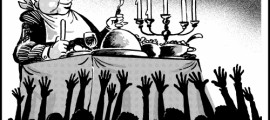Articles Posted by FCJ Editor
-
Behind the Protest Signs:
The Voices of Occupy San FranciscoThe clarion call of “We are the 99 percent” has driven home a blaring message about what protesters argue is a host of inequalities — of wealth, income, education, housing, economic opportunity, political clout, access to decent food and healthcare, and much more. Some protesters want to see corporate economic and political power reined in and others call for capitalism to be reformed, transformed or replaced. Proposals include enforcing existing regulations on corporate finance, breaking up corporate bank chains, creating a city-run municipal bank or expanding off-the-grid barter economies and alternative currencies.
-
Occupy Wall Street Protesters Shut Down Wells Fargo
Over Foreclosure CrisisWhile suit-clad Wells Fargo employees watched on – most refusing to talk to reporters, some disparaging the protest, a couple whispering their support – police carted away 11 of the 30 people who barricaded the bank’s doors at about 7:45 a.m. A coalition of labor and anti-war groups, communities of color including Causa Justa/Just Cause and Chinese Progressive Association, along with Occupy SF, filled downtown streets with chants and music, in a festive and feisty protest that went on for five hours.
-
Kim to Get Dunked in TNDC Celebrity Pool Toss (Tonight)
Other celebrities to take the plunge include socialite photographer Drew Altizer, Alexa Arena, vice president, Forest City Enterprises, Whitney Arnautou, first degree black-belt instructor of karate and creator of Core-a-Te – a conditioning and self-defense program, Erin and Bryana Cullen, TEAM CULLEN Family Toss (family of the late Brother Kelly Cullen, past TNDC executive director and Celebrity Pool Toss founder), Don Falk, TNDC executive director, John Pritzker,CEO, Geolo Capital, Team Twitter, Twitter, Inc., and Charles Zukow, CEO, Charles Zukow Associates.
-
Defend Democracy, Attend No on Prop E and F Fundraiser
“We must take our city back. This is about survival.”
— Ron Conway, Republican and $10,000 contributor to Proposition E to allow the Board of Supervisors to amend and even repeal voter-approved laws.Ron Conway made that statement last October before a business-friendly group at the Bay Area Council, according to the San Francisco Business Times. And according to that same paper, his call to “take our city back” was met with strong applause.
-
Class War Winners and Losers
There are official data over time called the Gini index or coefficient between zero and one that is a statistical measure of economic inequality. When it is zero national income is evenly distributed among all citizens, and when it is one all the income goes to one person. Obviously the Gini figure will be somewhere between zero and one. Some nations have very low values and others very high ones. In the high category is the US. But more important is that the index has changed over time, rising from about 1980 to current times, after it had remained fairly stable over several decades. That significant rise from about .37 to .45 shows unequivocally that the rich got richer as most of the population in the middle class and below lost ground.
-
Court Rules Prop. 8 Trial Tapes
Should Be Released to PublicJudge Ware agreed with Plaintiffs, stating, “Foremost among the aspects of the federal judicial system that foster public confidence in the fairness and integrity of the process are public access to trials and public access to the record of judicial proceedings. Consequently, once an item is placed in the record of judicial proceedings, there must be compelling reasons for keeping that item secret. In the course of the non-jury trial of this case, at the direction of the presiding judge, court staff made a digital recording of the trial. After the close of the evidence, the judge ordered the clerk of court to file that digital recording under seal. The trial record is closed and the case is currently on appeal to the Ninth Circuit.”
-
Adachi Makes Case for Mayoralty
Determined at an early age to work toward improving the justice system, Adachi earned his degrees through the University of California system. He worked up the ladder in San Francisco’s Public Defender’s Office, becoming chief attorney. Adachi was elected San Francisco’s Public Defender in 2002, inheriting an underfunded, short-staffed department overseeing over 20,000 cases a year. He reorganized the department and developed programs within the juvenile justice system to help wayward youth turn their lives around. Four years later, Adachi was recognized by the American Bar Association winning its award for the best public law office in the country.






 The Hunger Site
The Hunger Site
Recent Comments